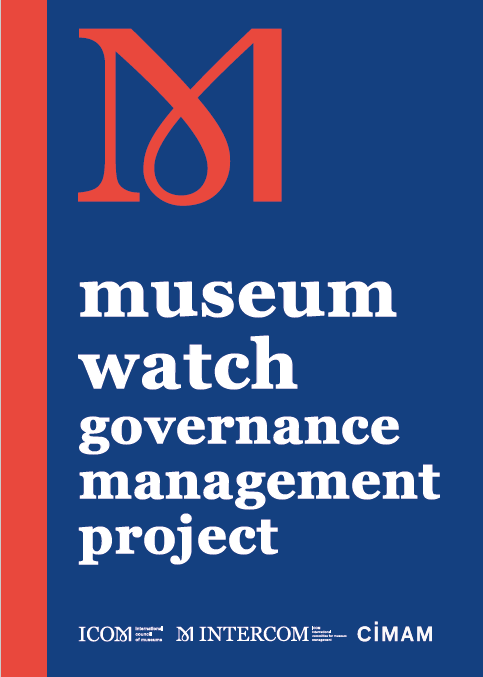INTERCOM and CIMAM introduce the Museum Watch Governance Management Project
Press Release – 3 May 2022

INTERCOM and CIMAM introduce the Museum Watch Governance Management Project as a special ICOM initiative to help the museum community address management challenges more effectively.
- The project aims to set international governance standards for museums and establish codes for external stakeholders to help museums survive this unprecedented crisis.
- The report pays attention to reported practices in several European countries of increasing political interference in museum management, thereby reducing the autonomy of museums in professional decision-making.
Tuesday, May 3rd, 2022 - The International Committee of Museum Management (INTERCOM) jointly develops the Museum Watch Governance Management Project with the International Committee of Museums and Collections of Modern Art (CIMAM) as a special initiative of ICOM, inspired by CIMAM's existing Museum Watch Committee (MWC).
With the participation of partner museums in South East and Central Europe - represented by the Regional Alliance for South East Europe (ICOM SEE) and ICOM Poland - the project explores how the professional community can respond to an increasingly volatile and risky environment, including inconsistent interference that challenges the neutrality of museums in their knowledge-sharing role. In response to these and other forms of interference, the study argues that introducing an explicit code of governance is a key response.
As INTERCOM president Goranka Horjan stated: "The project aims to boost the potential and integrity of museums and reduce vulnerabilities by increasing resilience. An adequate response to socio-economic challenges is directly linked to good governance and management practices.
The absence of a valid and shared code of governance allows museum staff, governing bodies, and funders to view governance principles as 'optional' rather than as an explicitly prescribed standard for practice. Consequently, this absence can often be a weakness, allowing external interference to occupy and influence this space.
Bart de Baere, Chair of CIMAM's Museum Watch Committee, and CIMAM Board Member stated: "Governance principles and governance deficits are not specific to contemporary art museums. However, this is where the response of CIMAM, which is part of the ICOM ecosystem, comes in. Therefore, it seemed logical that CIMAM's Museum Watch Committee approached INTERCOM to begin focusing on ideas, issues, and practices related to governance and leadership in the museum context. The whole plan then became an ICOM Special Project".
INTERCOM and CIMAM initiated the project to monitor trends and see how the professional community can respond to the growing risks. Two focus groups with a mix of museum professionals, policymakers, and experts from academia were set up in late June and early July 2021 to explore and gain further insight into some of the findings of the questionnaire and to better understand the local museum context and the nature of the interaction between different museum stakeholders.
A team of experts, including researchers Ian King and Annick Schramme, carried out the surveys and interviews that have helped map national and regional constraints to harness the creative potential of museums.
Main research outcomes include:
- The survey identified areas where government policies need to be aligned with good governance practices for museums to fulfill their mission. In-depth interviews with museum directors helped to understand how universal concepts can be used to map processes in the museum field, and to what extent the sector is regulated by policy, and what influence museum directors have in this process. The key question for museum directors is whether less interference from politics could benefit their institutions.
- Several areas of importance in the relationship between museums and politics have been identified: from morale and ethics, financial support and maintenance of resources to crisis management.
- The possibility of introducing a code of conduct for the cultural sector based on the six principles has also been discussed: the importance of the mission, a clear division of roles (who is responsible for what?), checks and balances (governance bodies should provide fairness and balance within and outside the organization), board composition (diversity and reflection of different stakeholders), stakeholder relations (and politics as the main stakeholder) and ethical behavior.
The huge autonomy gap observed in museums worldwide has prompted INTERCOM and its partners to carry out this research on governance and to map practices in European regions where an alarming lack of autonomy has been detected.
The first phase of the project revealed the complexity of the process and regional differences. In the next phase, INTERCOM and its partners will open further chapters related to good governance, with the support of ICOM, as the global professional organization whose primary mission is "to set professional and ethical standards for museum activities" (ICOM, n.d.), through the Special Project Grant in 2022.
Notes to Editors:
Title: Museum Watch Governance Management Project
Project Convenor: Bart De Baere & Goranka Horjan
General Editor: Goranka Horjan
Museum Watch Governance Management Project Team:
- Bart De Baere
- Alenka Černelić-Krošelj
- Goranka Horjan
- Inés Jover
- Piotr Rypson
- Jarosław Suchan
- Nathalie Verboven
CIMAM Museum Watch Committee partners:
Calin Dan, Sarah Glennie, Malgorzata Ludwisiak, Victoria Noorthoorn, Eugene Tan
PR_INTERCOM and CIMAM introduce the Museum Watch Governance Management Project